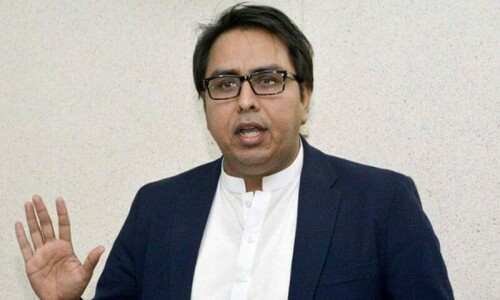History of Islam becomes the history of Pakistan when it comes to the notion that Pakistan was created for Islam and not for Muslims of the subcontinent. If history of Islam in sub-continent is considered history of Pakistan, many other histories are left out, e.g. Sindh and Baloch histories.
This was stated by Akbar S. Zaidi, professor at Columbia University and IBA, while speaking at the session, “Rethinking Pakistan’s History: Teaching and Learning” on Saturday, the second day of Afkar-i-Taaza being held at Qadhafi Stadium.
“What would be the place of Lahore in history as Punjab joined the freedom movement much later which was started by Urdu-speaking Muslims of Uttar Pradesh. What would be the status of Mohenjo-Daro, Harappa and Gandhara which are inside the geographical borders of Pakistan but outside ideological borders?” Mr Zaidi questioned.
He said the subject of history of Pakistan was confined to only the history of Pakistan movement. He raised another question whether we had enough material to teach history in our institutes while lamenting in the same breath that the subject of history was not given much importance in our country. He said Pakistani political scientists, journalists and anthropologists were often seen discussing history in conferences in India.
Dr Tahir Kamran, dean of Arts and Humanities of the GCU, lamented that the pattern of history in Pakistan revolved around a few personalities like Quaid-i-Azam, Allama Iqbal, Sir Syed Ahmed Khan, Sheikh Ahmad Sarhandi, terming it the history of the king, not of the masses. It seemed that our history had frozen in the years when Jinnah Sahib was the governor general, he said.
“Ideology and history are antithetical and when a moment gets static, it becomes ideology that’s why ideology and history were intermingled and unclear here.”
Dr Ali Usman Qasmi of Lums termed it a risky business to talk about regional history, Bacha Khan and Tehreek-i-Ahrar. He said the Two Nation Theory was implemented in Punjab and Bengal and frontier areas, Balochistan and Sindh were not its part.
“Selected history is taught in other nation states too, including India, Iran, the US but the issue in Pakistan is that there is no method in madness.”
Qasmi traced the issue to Gen Ayub’s regime when the word of India was removed from history from the term Indo-Pak and then even the term South Asia was not acceptable to the rulers. He said history of Pakistan could not be written without India.
Iqbal Chawla, dean of Arts and Humanities of the Punjab University, while negating the views of other panelists, said all all-inclusive history was being taught at the university level in Pakistan. He said our history was incomplete without Arab and Central Asian history.
He said some scholars gave strong remarks about history for not having enough knowledge of the work being done around them, adding that research work was being done on Pakhtuns, Baloch and Punjabi nationalities.
At this Akbar S. Zaidi quipped, saying that “all is well” signs come from Punjab University and Quaid-i-Azam University as it appears from Mr Chawla’s statements.
BACHA KHAN: A session was held on “The Unarmed Pathan: Bacha Khan’s Thought and Legacy” in which head of Department of History of Quaid-i-Azam University, Wiqar Ali Shah, objected to the use of word Pathan, terming it a colonial word, offensive to the Pakhtuns. He said from 1921 to 1947, there was a non-violence movement in the Pakhtun area, called Khudai Khidmatgar Movement.
Bacha Khan opposed the idea of Pakistan until 1948 on principles but he took oath of allegiance to Pakistan in February 1948 in front of Quaid-i-Azam in Karachi.
“Bacha Khan invited Quaid-i-Azam to Khudai Khidmatgar headquarters for lunch but when the time of lunch came, the Quaid refused to go there on the pretext of security and asked Khan to come to his residence for lunch which was offensive to Bacha Khan. After that, he was never allowed a meeting with Quaid-i-Azam.”
Dr Shah said in the last 40 years there had been militancy going on in the frontier areas and since the advent of the Taliban, 750 people related to Khudai Khidmatgar and National Awami Party had been targeted.
He said Bacha Khan had established a school in Dir in 1921 which was demolished by the Nawab of Dir. Later, he opened a school with boarding facility in his own home and admitted both his sons there. The first girls school was opened by him in 1928.
Dr Shah said 232 people were killed in Qissa Khawani bazaar in 1930 but there was no violent reaction after that from the region and this happened due to non-violent movement of Bacha Khan.
He said Bacha Khan had alliance with Congress due to a reason. “When the leadership of Khudai Khidmatgar was jailed, he was asked to get help from some big political party, Bacha Khan sent message to Sir Fazal as well as Feroze Khan Noon but both of them refused to help. At that time Gandhi came forward and raised a voice for them.”
Published in Dawn, April 3rd, 2016














































Dear visitor, the comments section is undergoing an overhaul and will return soon.